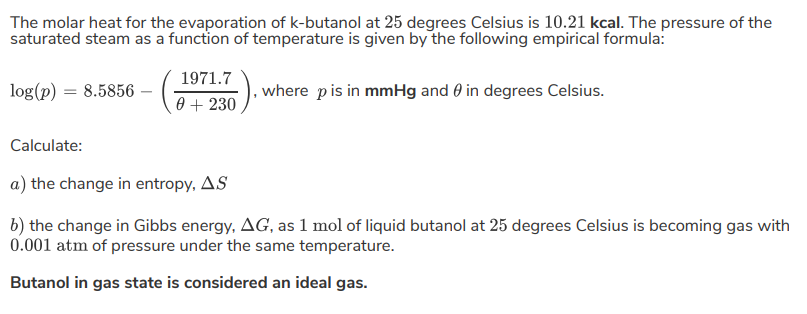Calculate the change in molar entropy and change in Gibbs' free energy when 1 mol of liquid butanol vaporizes at 25ºC to a gas that is at 0.001 atm?
The molar enthalpy for the evaporation of k-butanol at 25^@ "C" is "10.21 kcal/mol" . The pressure of the saturated steam as a function of temperature is given by the following empirical expression:
log(p) = -1971.7/(theta + 230) + 8.5856 ,
where p is the pressure in "mmHg" and theta is the temperature in ""^@ "C" .
Original question given here:
 useruploads.socratic.org
useruploads.socratic.org
The molar enthalpy for the evaporation of k-butanol at
log(p) = -1971.7/(theta + 230) + 8.5856 ,where
p is the pressure in"mmHg" andtheta is the temperature in""^@ "C" .
Original question given here:
 useruploads.socratic.org
useruploads.socratic.org
1 Answer
DeltabarS_"vap" = "18.62 J/mol"cdot"K"
DeltabarG_"vap" = "37.17 kJ/mol"cdot"K"
For this, we are changing pressure at constant temperature. For the total derivative of the molar entropy as a function of temperature and pressure,
dbarS(T,P) = ((delbarS)/(delP))_TdP + cancel(((delbarS)/(delT))_PdT)^(0)
at constant temperature. From the Gibbs' free energy Maxwell relation,
dbarG = -barSdT + barVdP ,
we know that
dbarS = -((delbarV)/(delT))_PdP .
Assuming k-butanol is an ideal gas,
PbarV = RT -> barV = (RT)/P ,
so
intdbarS = -R int_(P_1)^(P_2)1/PdP
As a result,
DeltabarS = -Rln(P_2/P_1)
Now, the vapor pressure above the liquid is given as:
log p = -(1971.7)/(theta + 230) + 8.5856 where
p is in"mm Hg" andtheta is in""^@ "C" .
At
P_1 = 10^(0.8534)/("760 torr/atm") = "0.009389 atm" .
The second pressure is given for the evolved gas upon vaporization as
So, the change in entropy for vaporization of liquid k-butanol at
color(blue)(DeltabarS_"vap") = -"8.314472 J/mol"cdot"K"ln("0.001 atm"/"0.009389 atm")
= color(blue)("18.62 J/mol"cdot"K")
At constant temperature,
DeltaG = DeltaH - TDeltaS ,
so the change in Gibbs' free energy of vaporization is:
color(blue)(DeltabarG_"vap") = "10.21 kcal/mol" xx "4.184 J"/"cal" - "298.15 K" cdot 18.62 xx 10^(-3) "kJ/mol"cdot"K"
= color(blue)("37.17 kJ/mol"cdot"K")
This should make sense because the boiling point should be much higher than

